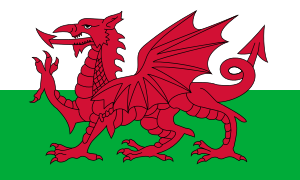Unionism in Wales
 |
| This article is part of a series on the politics and government of Wales |
|
Law and justice |
|
Wales in the EU |

Wales within the United Kingdom
Wales was assimilated into England by way of a series of changes and events that occurred between the Norman invasion of Wales starting in 1067, and the Laws in Wales Acts of 1535 and 1542, which effectively annexed the whole of Wales within the Kingdom of England.
The political union between the Kingdoms of England and Scotland was created through the Act of Union 1707. This united the two previously independent states, which had shared the same monarch in a personal union since 1603, under the Parliament of Great Britain. With the Act of Union 1800, the Kingdom of Ireland united with Great Britain to become the United Kingdom of Great Britain and Ireland. After the partition of Ireland, through which most of Ireland left the United Kingdom in 1922, the state became the United Kingdom of Great Britain and Northern Ireland.
The history of the Unions is reflected in various stages of the Union Flag, which forms the flag of the United Kingdom. As a historically fragmented territory and later a possession of England, Wales never signed an act of union with any of the other countries of the United Kingdom, and is not distinguished from England within the national flag. Its position in the Union came about as a result of its relationship with the English Crown.
The establishment of the National Assembly for Wales in 1998 confirmed Wales' position as a distinct nation, and as a recognised constituent country of the United Kingdom.
Support in Wales for the Union
Support in Wales for the Union has historically been strong, in part due to the country's strong economic and cultural links to England, with which it shares a long border, as well as the traditional dominance of the pro-Union Labour Party in Wales' most heavily industrialised areas. While there was growth in nationalist sentiment, there was little appetite for home rule and independence in Wales during the 19th and early 20th centuries, at a time when independence movements in Ireland and Scotland were gaining support. Support for the Union has since declined somewhat, reflected in the political inroads made by pro-independence Plaid Cymru. In recent years, support for the Union is consistently shown as being at between 85 and 90 per cent of the population.[1] A 2001 survey for the Institute of Welsh Affairs found that 11% of people polled favoured independence.[2]
Support for the Union and political parties
Political support for the Union is widespread, with three of the four major political parties in Wales advocating remaining within the UK. Support for the Union is found in political parties on both the right and left of Welsh politics.
Political parties in Wales who support continued membership of the United Kingdom
- Welsh Conservative Party
- Welsh Labour
- Welsh Liberal Democrats
- UK Independence Party
- Green Party of England and Wales
Welsh political parties opposed to the Union
See also
- Unionism in the United Kingdom
- Unionism in Scotland
- Unionism in Ireland
- Unionism in England
- Welsh independence
- Britishness
References
- ↑ "Welsh firmly back Britain's Union". BBC News. 16 January 2007. Retrieved 15 July 2009.
- ↑ Cole, Alistair; J. Barry Jones; Alan Storer (September 2001). "Consensus Growing for Stronger Assembly" (PDF). Institute of Welsh Affairs. Retrieved 16 July 2009.